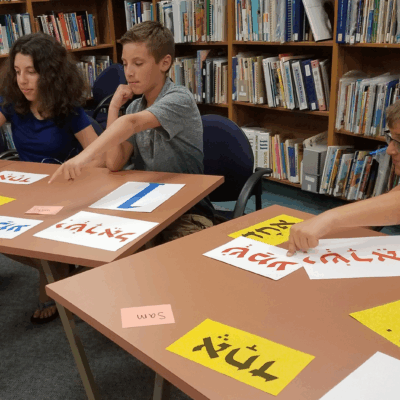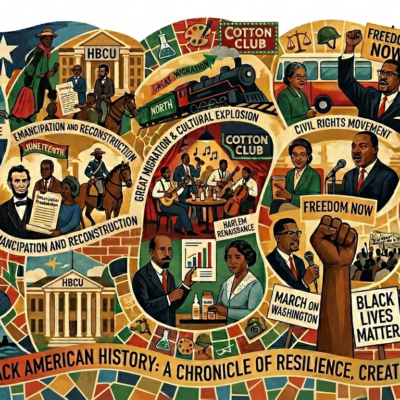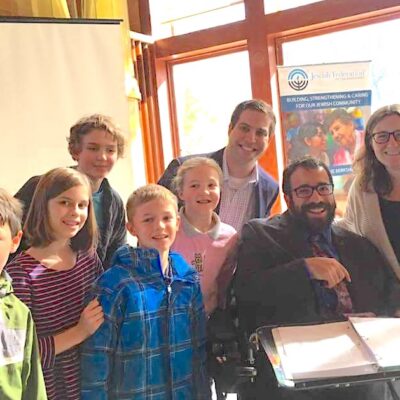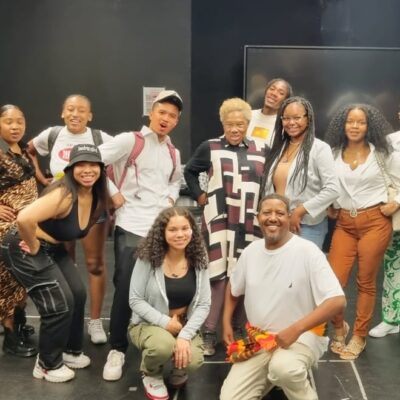Opinion
The power of the pivot
It was the last morning of our service trip to Pittsburgh when I stood at the front of the bus and addressed my incredible group of Jewish high school juniors and seniors with the following instructions: “We are on our way to Target. You will have 20 minutes and $20 per person. Combine yourselves into teams of five to six and figure out how many complete ‘refugee welcome kits’ you can assemble with the money you have. Once you have all your items and are as close to your budget as possible, meet me at the checkout.”
We were about to find out if this crazy idea of mine would come to fruition in the epic way I hoped it would.
I am the director of the Wexner Service Corps (WSC), a service-learning initiative for Jewish teenagers in Columbus, Ohio, launched in June 2013 through the generous support of Les and Abigail Wexner and the Wexner Foundation. WSC members strengthen their Jewish identities through learning and living Jewish values, volunteering both within the Columbus community and in several other communities nationwide.
Each year, the program ends with a culminating trip to a different community that resembles Columbus in some way, so that participants can use what they have learned about their city and compare it with the needs of another. This year we traveled to Pittsburgh, where we volunteered with a range of organizations: a diaper bank, an urban farm, a food bank and a refugee resettlement agency. Our days were packed with critical service work, Jewish learning, team building and fun.
At the end of each day, our leadership team would sit down to reflect and prepare for the next day. On the final evening of the trip, after all the teens were back in their rooms for curfew, we sat down to look at the next (and final) morning’s schedule. Our plan to volunteer at a local refugee resettlement agency called Hello Neighbor was already a pivot from a previous plan since another organization we had intended to work with canceled just a week before the trip. We wanted to confirm that the supplies we had ordered to make welcome kits for refugees — shampoo, conditioner, shaving kits, toothbrushes and toothpaste, deodorant, etc. — had actually arrived at their office for us to sort and pack the next morning. When we checked, however, we were devastated to find out that the supplies had in fact never arrived.
By the time we figured this out, it was already 11 pm on that final night. Stores were closed. We considered placing an online order at a local store and scheduling pickup for the next morning, but there was no guarantee that the supplies would be ready by the time we’d need them. We also considered going to Hello Neighbor as planned and just learning about their organization and its mission without actually volunteering in any capacity. We even contemplated the option of getting on the bus and heading home early.
It was at that moment that I knew we needed to think outside the box. I asked my fellow staff members to give me a moment to think, and I sat quietly for about 10 seconds. Then, it came to me. I knew that my proposal would be a bit of a leap, but I believed strongly that, if we could pull it off, the experience and the learning that would come from it could be powerful and profound.
My idea was as follows: In the morning, we would take the teens to a store located near the organization. We’d give them a budget and challenge them to gather and purchase the supplies needed for the project. They would need to think about how to best fulfill Hello Neighbor’s request for bags containing every item, and which brands of products they could afford with the budget we would give them. Instead of working alone, we would ask them to form small groups to help their money go further and engage in collaborative decision-making to achieve their goal.
After breakfast in the morning, we got on the bus and explained all the rules of the “challenge” to the teens. They spent the bus ride arranging themselves into teams and developing plans for who would be responsible for each of the nine toiletry items on the list. When we got to Target, we reminded them about the 20-minute time limit and they hurriedly set off on their quest.
For many of the teens, this was the first time they had to utilize price comparisons and navigate shopping on a tight budget. Stressed by the time crunch, some were also frustrated that they had to buy everything on the list and didn’t have the option to prioritize the items that seemed more important to them. Intense conversations in the aisles ensued. Did a 3-in-1 shampoo, conditioner and body wash count as one item, or did they need to get each item individually? What constituted “shaving supplies” — was shaving cream required, or could you shave without it? How many menstrual pads (and what variety!) needed to be in one welcome kit? Each group had moments of panic as they price-checked and realized that they had all gone over budget, but we allowed them a little leeway (even though that wasn’t a true simulation of reality).
Once all the purchases were completed, we went outside to meet the bus, only to realize that it couldn’t park at our location, so we proceeded to carry everything several blocks to meet the bus instead.
When we finally reboarded the bus and sat down with our bags, we tallied up the numbers of each kit item purchased. We were only about to package about 17 complete welcome kits with the entire group’s money combined.
The teens began to reflect on the morning’s experience and its outcome. To my great delight, they were feeling, in the parlance of the young, “all the feelings.” There was frustration, disappointment and exhaustion (“Why was this so hard?”) as well as excitement, energy and happiness (“We did it!”). They shared their observations with such honesty. One participant, for instance, admitted that anytime they go shopping on their own, they don’t usually pay attention to prices or different labels; if they want something, they go in and buy it, and it costs whatever it costs. Never before had they thought about or imagined what it would feel like to have to think about whether you could buy the thing you wanted — especially when it came to something as basic as toiletries — and be able to afford it. Others noted how expensive store-brand products are, and how surprised they were that their money couldn’t go as far as they anticipated even if they shopped for the best bargain.
The WSC teens gained insight into how much more complicated and involved shopping can be for refugees, and they were able to envision some of the many obstacles refugees face when engaging in tasks others would consider effortless day-to-day errands.
It would have been understandable and an easier option if we just accepted defeat on the last night of the trip — the supplies hadn’t arrived, so the final day’s project wasn’t going to happen. We had already conducted a very successful and meaningful week of service and learning, so leaving first thing in the morning would have theoretically been fine. But that wasn’t the path we chose. Instead, we took the opportunity to lean into a pivot and take a chance that this alternative plan would be successful in ways we could and could not anticipate. That decision gave the teens a prime opportunity to develop their sense of empathy, allowing them to put themselves in the shoes of refugees, who might experience any or all of the constraints they encountered: the time crunch, the shlepping, the limited budget, the price comparing and much more. The experiential learning and reflections of that morning were so much more meaningful than just showing up at Hello Neighbor with our preordered supplies. It also offered a critical lesson for our leadership team about the value of not wrapping up every experience perfectly with a bow on top for our teens. Empowerment through experiential learning at every opportunity, even when it’s challenging, should always be the goal.
Our experience in Pittsburgh is likely one none of us will forget and a great reminder to embrace the pivot — even when it seems crazy.
Rabbi Sharon Barr Skolnik, a native Clevelander and graduate of Brandeis University and the Jewish Theological Seminary, serves as the program director for the Wexner Service Corps in Columbus, Ohio.

 Add EJP on Google
Add EJP on Google








